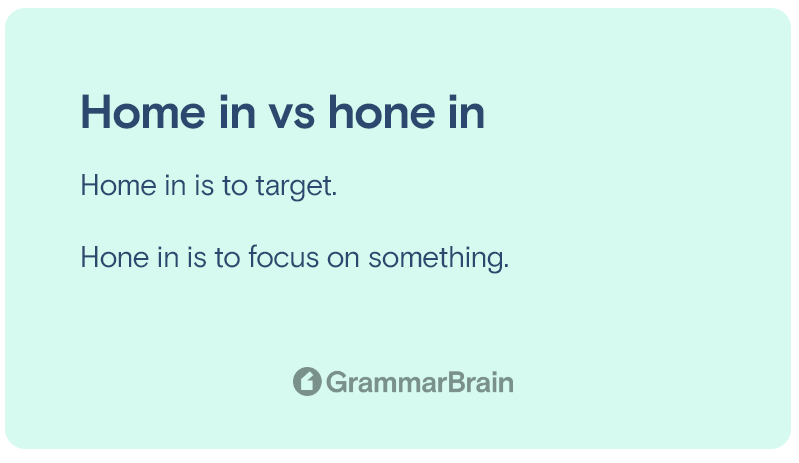There is a big difference between hone in and home in. When you are trying to focus or get something done, it is best to hone in. When you are with family or friends and want to feel at home, it’s best to home in. Let’s explore the differences.
Home in vs. hone in—key differences
To hone in, we are referring putting your complete focus on it. To home in, we are suggesting to target something more directly.

What does it mean to “hone in” on something, and how can you do it effectively?
The word “hone in” frequently describes the way of focusing on a specific goal or target. But, what does it actually mean to “hone in” on something? And how can you do it?
For instance, to “hone in” on something means to focus your attention and efforts on that specific thing. It is also one way of adjusting to zero on your goal then you can reach to goal much more efficiently.
There are some different ways that you can “hone in” on something. One is to break down your goal into smaller manageable pieces.
For example, if you’re trying to lose weight, you should break your goal down into smaller goals, like losing 5 pounds in the first month, and then 10 pounds in the second month.
By breaking your goal down into smaller pieces, you can focus your attention and efforts on each individual goal, and you are more likely to achieve your overall goal as a result.
Another way to “hone in” on something is to avoid distractions. If you are trying to focus on your work, for instance, you might turn off your phone, close your emails inbox, and find peaceful place to work.
By avoiding distractions, you can always better focus on what is important, and you will be more likely to achieve your goal as a result.
What does it mean to “home in”?
When you “home in” on something, you are zeroing in on it. You are honing in on it. which means you are focusing your attention on it intently.
For example, if you are looking for your keys, and you remember that you left them in the living room, you will start by looking in the living room.
Then, if you don’t find them there, you will move on to other rooms until you finally find them. In this way, you are how “homing in” on the keys by systematically searching through all the likely places they could be.
You can also “home in” on a person or a goal. For example, if you are looking for a new job, you might start by looking at job postings online. Then, you may narrow down your search to jobs that are in your field and in your city.
Finally, you might apply to a few jobs that you are particularly liked in. In this way, you are “homing in” on the ideal job for you by gradually eliminating options that are not a right fit.
How are hone in and home in similar and how are they different?
Hone in and home in are both phrases that mean to focus or direct something toward a particular goal. However, there is a subtle difference in how these phrases are used.
Home in is typically used when referring to a physical object, such as a missile, that is moving toward its target.
Hone in, on the other hand, is more often used figuratively to mean that someone is focusing their attention or efforts on a particular goal.
Here are some examples:
- The missile homed in on the enemy ship.
- The company has been honing in on new markets for its products.
In summary, home in is used more literally to describe the movement of an object, while hone in is used figuratively to describe the focus of attention or effort.
Conclusion
English has two different verbs for this action, depending on what you’re trying to achieve. If you want to focus on something or someone, use the verb hone in. However, if you want to head straight for a location or target, use the verb ‘home in.’
Both have their own benefits and drawbacks. It all depends on what your goal is. So which one do you prefer?
Inside this article
Fact checked:
Content is rigorously reviewed by a team of qualified and experienced fact checkers. Fact checkers review articles for factual accuracy, relevance, and timeliness. Learn more.
Core lessons
Glossary
- Abstract Noun
- Accusative Case
- Anecdote
- Antonym
- Active Sentence
- Adverb
- Adjective
- Allegory
- Alliteration
- Adjective Clause
- Adjective Phrase
- Ampersand
- Anastrophe
- Adverbial Clause
- Appositive Phrase
- Clause
- Compound Adjective
- Complex Sentence
- Compound Words
- Compound Predicate
- Common Noun
- Comparative Adjective
- Comparative and Superlative
- Compound Noun
- Compound Subject
- Compound Sentence
- Copular Verb
- Collective Noun
- Colloquialism
- Conciseness
- Consonance
- Conditional
- Concrete Noun
- Conjunction
- Conjugation
- Conditional Sentence
- Comma Splice
- Correlative Conjunction
- Coordinating Conjunction
- Coordinate Adjective
- Cumulative Adjective
- Dative Case
- Determiner
- Declarative Sentence
- Declarative Statement
- Direct Object Pronoun
- Direct Object
- Diction
- Diphthong
- Dangling Modifier
- Demonstrative Pronoun
- Demonstrative Adjective
- Direct Characterization
- Definite Article
- Doublespeak
- False Dilemma Fallacy
- Future Perfect Progressive
- Future Simple
- Future Perfect Continuous
- Future Perfect
- First Conditional
- Irregular Adjective
- Irregular Verb
- Imperative Sentence
- Indefinite Article
- Intransitive Verb
- Introductory Phrase
- Indefinite Pronoun
- Indirect Characterization
- Interrogative Sentence
- Intensive Pronoun
- Inanimate Object
- Indefinite Tense
- Infinitive Phrase
- Interjection
- Intensifier
- Infinitive
- Indicative Mood
- Participle
- Parallelism
- Prepositional Phrase
- Past Simple Tense
- Past Continuous Tense
- Past Perfect Tense
- Past Progressive Tense
- Present Simple Tense
- Present Perfect Tense
- Personal Pronoun
- Personification
- Persuasive Writing
- Parallel Structure
- Phrasal Verb
- Predicate Adjective
- Predicate Nominative
- Phonetic Language
- Plural Noun
- Punctuation
- Punctuation Marks
- Preposition
- Preposition of Place
- Parts of Speech
- Possessive Adjective
- Possessive Determiner
- Possessive Case
- Possessive Noun
- Proper Adjective
- Proper Noun
- Present Participle
- Prefix
- Predicate



